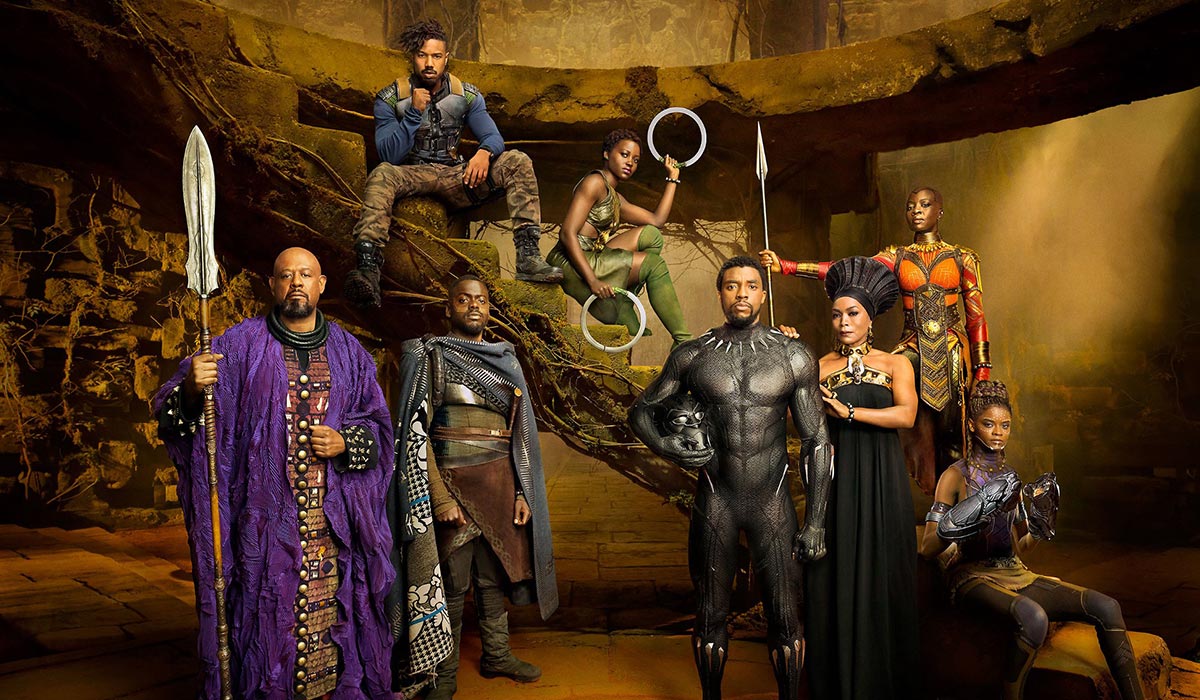Trauma and Healing in Black Panther, Part One

This week on the podcast, Dr. Dan Allender steps aside as host and trades places with Rachael Clinton, Assistant Director of Program Development & Admissions, who facilitates a conversation about the recent hit film Black Panther with Wendell Moss, a mental health therapist and member of our Teaching Staff, and Michael Thornhill, Assistant Director of Cross Cultural Ministry for the Coalition for Christian Outreach. (Featured image: Black Panther cast; Marvel Studios.)
Rachael explains up front that this discussion presumes most listeners have already seen Black Panther. (In other words, spoiler warning.) If you haven’t seen it yet, our official recommendation is that you press pause and, as soon as possible, go catch it while it’s still in theaters. We’ll be here when you get back.
Rachael: “At The Allender Center, we think stories matter. And when you encounter a good story that’s full of humanity and human complexity in all of its glory and all of its pain, it’s a story worth spending time with.”
Michael, Wendell, and Rachael offer a basic refresher on some of the Black Panther context and characters. They talk about what the film means to them personally and about why it seems to have resonated so deeply throughout the world. Michael, who teaches and equips campus ministers and ministry leaders across the nation and is, as Rachael says, “our resident Marvel nerd,” reflects on Black Panther’s role as the 18th film in the Marvel Cinematic Universe franchise—and the first with an African-American director and a predominantly black cast.
Michael: “It’s significant for me to see a film where black suffering is not the only highlight, nor black thuggery. I’m tired of seeing blacks either in chains or traumatizing other people with violence. I feel like this film gives permission for a fuller picture to be portrayed—not just black suffering, but black aptitude as well as achievement.”
Wendell: “When I first saw it, I was proud of it. I was proud to see what was communicated when it came to African culture. It was good to see a film where black folk were highlighted and honored. Not only that—our story was told. Even in a small way, it began to be told in a way that felt powerful and important to me.”
Black Panther tells the story of Wakanda, a technologically and intellectually advanced nation full of powerful, heroic figures. The film shows its characters’ brilliance, beauty, and glory, as well as their fears and traumas. It’s a superhero movie, yes, but also a film that very intentionally deals with very real issues of humanity and trauma.
Wendell: “Even in the midst of their heroism, they have their own brokenness—with that, they have their own desires, they have their own wants, they have their own fears.”
The conversation touches on the vibrant, heroic characters in the film: women who stand in the gap with strength and honor, who are not sexualized to matter to the story and are not a means to an end; a villain who is not easy to explain away or write off as bad; a complex, prophetic ally who faces the opportunity to be seduced by a lust for power; a hero who wrestles with the mantle of calling and the trauma of history.
Michael: “This movie kills the idea that the villain can just be one person, that someone can just be defined by their trauma. […] Trauma makes you choose either your glory or your shame—you have to be one or the other. […] Can you wear both your glory and your shame?”
Next week, Wendell, Michael, and Rachael will dive more deeply into the multi-faceted beauty of these characters, reflecting on what they reveal about the nature of trauma and healing.
